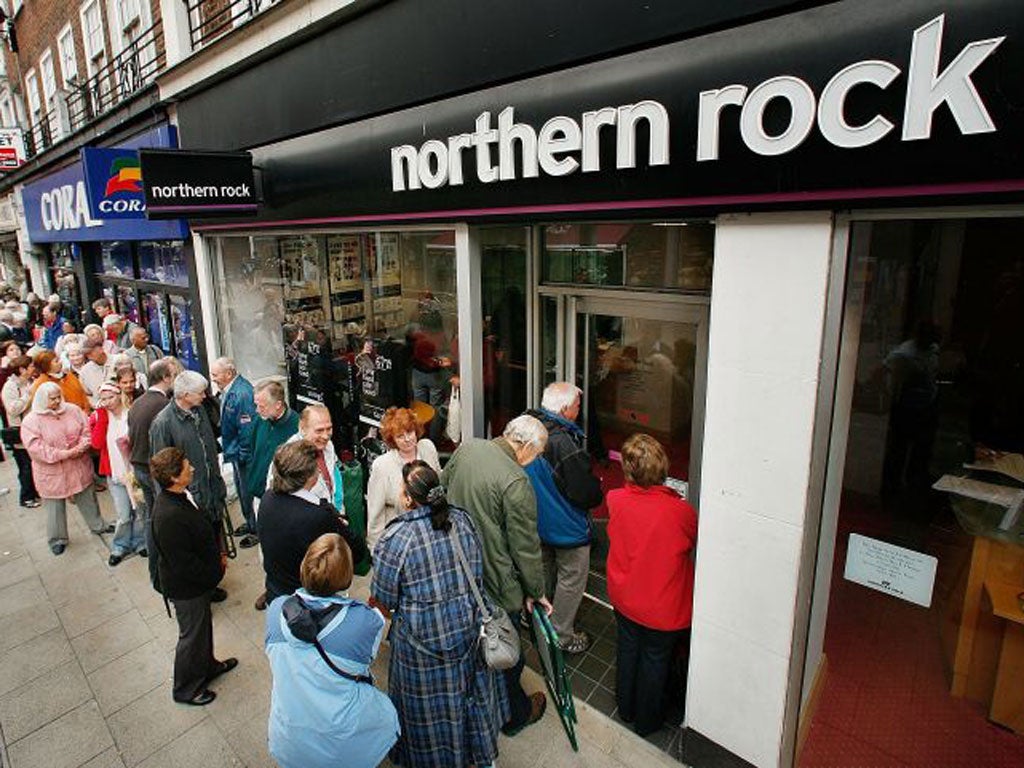Five years on from Northern Rock: It's a whole new world
The run on Northern Rock in 2007 changed the market landscape for investors, but have they learnt the lessons? Emma Dunkley reports

Your support helps us to tell the story
From reproductive rights to climate change to Big Tech, The Independent is on the ground when the story is developing. Whether it's investigating the financials of Elon Musk's pro-Trump PAC or producing our latest documentary, 'The A Word', which shines a light on the American women fighting for reproductive rights, we know how important it is to parse out the facts from the messaging.
At such a critical moment in US history, we need reporters on the ground. Your donation allows us to keep sending journalists to speak to both sides of the story.
The Independent is trusted by Americans across the entire political spectrum. And unlike many other quality news outlets, we choose not to lock Americans out of our reporting and analysis with paywalls. We believe quality journalism should be available to everyone, paid for by those who can afford it.
Your support makes all the difference.A lot can change in five years, but no one could have predicted how much the run on Northern Rock, and the ensuing credit crunch, would alter the UK's economy.
Before 14 September 2007, when people panicked and queued for hours to withdraw their cash from ailing branches, it was relatively easy to find an investment return, whether it was in a savings account or in property.
But since 2007, figuring out where to put your hard-earned cash – if only to preserve its value – has become a challenge. Savers have been punished, with the base rate cut from 5.25 per cent to a record low of 0.5 per cent, while inflation has soared, hitting highs above 5 per cent.
It's not as if there have been many other obvious investment opportunities, with shares hardly shining, property having a torrid time, and yields on government bonds now hovering at lows of less than 2 per cent. So five years on from Northern Rock, what lessons have been learnt and where is the best place to invest your money?
"The global financial crisis has brought pain, misery and in many cases significant financial losses to both savers and investors," says Patrick Connolly of AWD Chase De Vere. "The idea that you could invest in the stock market for just a five-year period now seems foolhardy, with most people advocating a minimum period of 10 years and often more."
As well as having to invest for longer, you will also have to scale back your expectations. Mr Connolly says: "The view on likely returns has changed, with long-term stock performance now set to be far more muted than before."
Meanwhile, it seems the so-called "blue chips" aren't all as robust as they once appeared. "With banks, you're tripping over banana skins on a regular basis," says Tim Steer, a fund manager at Artemis. "There have been Libor manipulations, transactions for Middle Eastern countries that shouldn't have been done, and selling the wrong products to people. They're not blue chips any more."
In fact, what can now be considered a blue chip has changed, with a lot of banks falling out of that category. While there were three banks in the top 10 companies in the FTSE 100 back in September 2007, HSBC is now the only survivor.
Indeed, the financial crisis has led people away from banks and towards defensive sectors that can withstand the economic turmoil, such as pharmaceuticals and tobacco.
"Pharmaceutical stocks, for example, still offer excellent value in my opinion," says Michael Clark, a fund manager at Fidelity Worldwide Investment. "GlaxoSmithKline and AstraZeneca in particular are favourites. Glaxo's share price is ar the same level as 15 years ago, yet earnings have doubled over that time. The stock yields more than 5 per cent with the prospect for decent dividend growth as well."
Aside from the more defensive companies that have done well, Gemma Godfrey an investment director at Brooks Macdonald says gold has more than doubled in value over the past five years, as people have fled to safety.
"Government bonds likewise have done well, up almost 50 per cent, attracting investors due to the UK Government's highest credit rating," she adds. "Corporate bonds have also performed well, with companies paying down debt to be in a stronger financial position."
But the search for safety is not as easy as it might seem. "From banking scandals to sovereign troubles, some assets perceived as 'lower risk' have come under pressure," says Ms Godfrey. She says investors have to "mind the minefields" and get used to more volatility in stock markets.
Graham Duce, a fund manager at Aberdeen, says: "Equity investors have had a tough time over the past 12 years; it's been about making money in bond markets. But the UK market has a decent yield with prospects for growing that dividend. So investors will do well to focus on equity income, not just in the UK, but globally.
"We're now seeing a rich source of income in Europe, Asia and the US. So equity investment with a yield is something you should consider over the next five years."
He also has a positive view on European equities over the longer term. In contrast, he says he would be reticent to invest in gilts, German bunds or US treasuries over the next five years because they are already pricey.
If you are very risk-averse, Mr Connolly says you should remain in cash, but accept that the value of your savings will continue to fall in real terms. "For everybody else, the best approach is to spread risks with a diversified investment portfolio containing cash, shares, property and fixed-interest."
Emma Dunkley is a reporter for Citywire.co.uk
Join our commenting forum
Join thought-provoking conversations, follow other Independent readers and see their replies
Comments